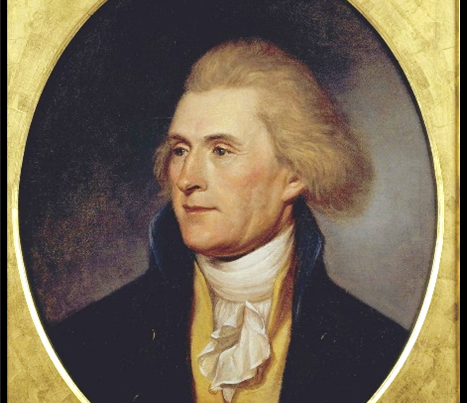Historians and pundits came out in droves decrying President Trump’s recent claim that Andrew Jackson could have negotiated a peaceful resolution to the Civil War. Infusing their alarm was Trump’s clumsy chronology connecting Jackson to the Civil War and his optimism that the war could have been averted.
This is what Trump said:
…Had Andrew Jackson been a little later, you wouldn’t have had the Civil War. He was a very tough person, but he had a big heart. He was really angry that he saw what was happening with regard to the Civil War. He said, “There’s no reason for this.” People don’t realize, you know, the Civil War — if you think about it, why? People don’t ask that question, but why was there a Civil War? Why could that one not have been worked out?
In unison critics concluded that Trump is historically illiterate, positively ignorant, and yes, of course, hopelessly racist. Historians Thomas Foster and Margaret Storey of DePaul University illustrate these type reactions. “One could dismiss this as simple (if shocking) illiteracy. But historical illiteracy is not a joke, and we dismiss it at our peril. …Our president … wields his ignorance like a weapon.” Moreover, Trump only uses history to further his denial “that slavery was at the core of the Civil War.” For good measure they dish out the ultimate insult, connecting Trump with those who “deny other historical atrocities, including the Holocaust.”[1] If this is how these historians draw evidence from sources, I am not impressed.
There is nothing in Trump’s statement that unequivocally indicates he did not understand the chronology of events. In fact, his statement shows he did understand. He stated that “had Andrew Jackson been a little later, you wouldn’t have had the Civil War.” Trump clearly understands that Jackson and the war were not parallel in time. Granted, his wording is fuzzy, something that can easily happen in an on-the-spot interview. But for so many to respond in a condescending way, says more to me about their own trigger-happy arrogance than about Trump’s ignorance.
Were there corollaries between Jackson’s policies and the later war? Anyone who has even a cursory knowledge of American history knows that the nullification crisis of the 1830’s was connected with later issues leading to the Civil War (states’ rights, secession, federal enforcement of protective tariffs, etc.). Consider the following by Jackson scholar Robert Remni.
The central question of the nullification controversy, raised by the tariff dispute, was whether the states had the right to declare federal law invalid within their boundaries (and, if necessary, to secede from the Union) in order to protect their rights, particularly their property rights.[2]
Remini understood that the swirl over nullification could have sparked a secession crisis thirty years before the Civil War. Could Trump have been referring to Jackson’s well known anger at South Carolina over nullification? Or is it possible Trump is thinking of the 1830 Jefferson Day dinner where Jackson gave his famous toast: “The Union: it must be preserved.” Vice President John C. Calhoun responded with his own toast: “The Union, next to our liberty the most dear.” Is it unreasonable to see this early divide as a precursor to a later conflict? Frankly, I have no idea if Trump knows these things or not, but it seems reasonable to give him the benefit of the doubt considering the plethora of historical connections. There certainly is no cause for the flood of mean-spirited mockery from the ivory tower.
What about Jackson the negotiator? Jackson is not particularly known for his willingness to negotiate for peace. Old Hickory would not have been my first choice for the “art of the deal.” I am not sure he would have even tried to negotiate with the seceding states. After all, he was ready to go to war with South Carolina just to enforce the tariff of 1828. Jackson and Lincoln held similar views on state subordination to the central government, so there is little evidence to suggest he would have acted differently than Lincoln. But this is a matter of interpretation, not clear-cut historical evidence.
Foster and Storey conclude that Trump’s wishful thinking proves he does not believe slavery was the cause of the Civil War. Few, including Trump, would deny that slavery, or at least slavery’s expansion, was a major underlying issue dividing the country. But to lock into a monolithic interpretation on any major event in history is classic whiggish oversimplification. Moreover, to go a step further and pretend we know the war was, as William Seward claimed, an “irrepressible conflict,” opens the door to a host of historical fallacies. Historians should never claim absolute inerrancy on causation of events, especially one as complicated as the Civil War.[3] When we close the door to all possibilities of interpretation we inevitably move from empirical scholarship into a type of dogmatics far removed from the rules of evidence.
Trump thinks that the North and South could have negotiated a peace. So what? No one can say for certain either way. Yet, famed historian Eric Foner does exactly that. “Even Andrew Jackson, were he alive, could not have solved the problem,” he said. “The situation in 1861 was far more dire than in the 1830s during the Nullification Crisis.”[4] Even if Trump is wrong, is that such a bad thing? Is it sinister to wish that 700,000 lives could have been spared? Was there no way to positively deal with the slavery question, reduce the Morrill tariff, and keep the union together—all by hard nose negotiation? Maybe not. But one would have to adopt a methodology of historical “divination” to make an absolute claim. What type of counterfactual thinking gives historians the inside track that war was absolutely inevitable? Where did this self-providentialist mentality come from? It is interesting to see so many historians who normally deny the very idea of providential inevitability confidently insert their own similar dogma in its place.
Whether or not the Civil War was inevitable as modern historians seem to “know,” I actually appreciate Trump’s real-world questions about the lack of negotiation? Is it not better for a president to believe in negotiation over war, especially civil war? Is this type of hopefulness a necessary sign of historical ignorance? It is worth noting that in the heat of Andrew Jackson’s saber rattling, he allowed negotiation to win the day. Jackson went along with Henry Clay’s less intrusive 1832 tariff, and South Carolina consequently backed down. For good measure, South Carolina nullified the Force Act, but Jackson ignored the action, and civil war was averted.
A president needs to be measured, definitive, informed, and accurate. I hope Trump will improve in this area. Time will tell. His unpredictable stream of consciousness is concerning, but I am equally concerned with the intentional and purpose-driven statements coming from so many ideologically driven critics. A deeply alarming headline that jumped out at me was from the previously quoted Chicago Sun Times article by DePaul professors Foster and Storey. Their headline reads, “Trump’s Assault on our National History Must End.” Read that again and think about its implications in a free society. It is almost as if they see Trump’s comments as treasonous. Outside the fact that such a statement could be interpreted as a veiled threat to a sitting president, one wonders at the amount of arrogance it takes to claim such a one-size-fits-all national history, and that someone’s dissent from that orthodoxy is an “assault” that “must” be stopped. I can hardly imagine a more elitist, fundamentalist-like, and undemocratic view of history. Just how they think Trump should be stopped is not clear. I will try to give them the benefit of the doubt.
[1] Thomas Foster and Margaret Storey, “Trump’s Assault on our National History Must End,” The Chicago Sun Times, May 2, 2017.
[2] Robert V. Remini, Andrew Jackson: The Course of American Democracy, 1833-1845 (New York, 1984), 16.
[3] For a good primer on the vast complexities associated with causation see David Hackett Fischer, Historians’ Fallacies: Toward a Logic of Historical Thought (New York, 1970), 164-186.
[4] Jonathan Lemire, “Trump on Civil War: Why Couldn’t They Have Worked That Out?,” AP: The Big Story, May 1, 2017.







